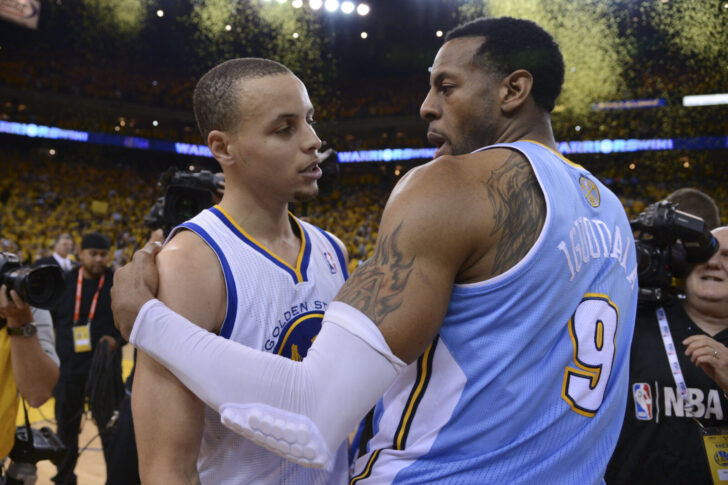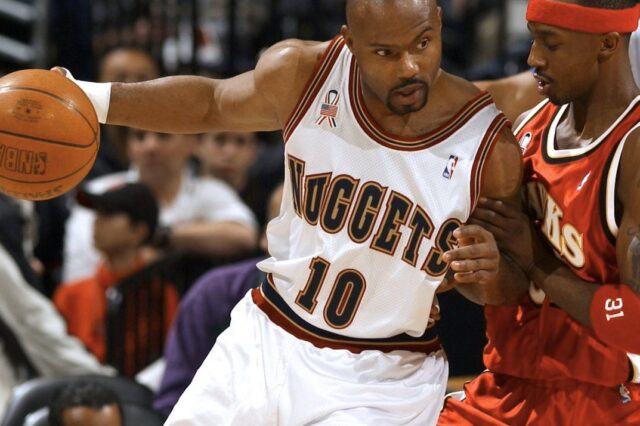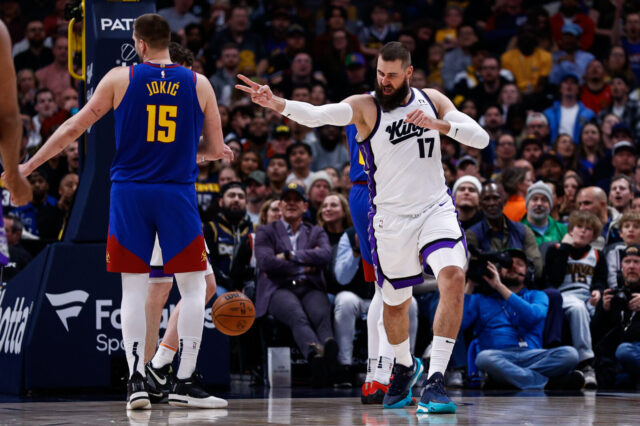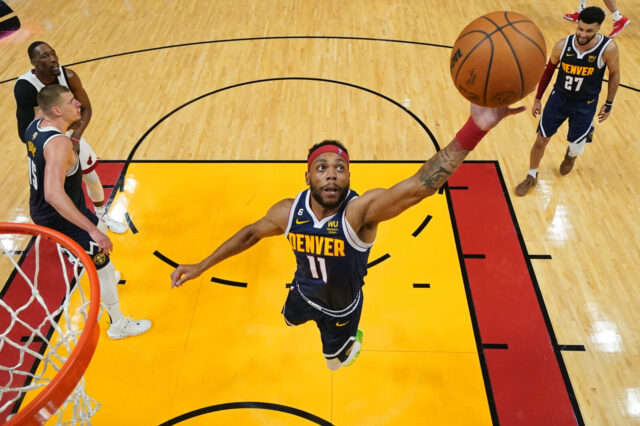This past week Andre Iguodala announced his retirement form the NBA. A nineteen year vet, four time NBA champion and the 2015 NBA Finals MVP, Iguodala’s career is without a doubt decorated and maybe even hall of fame worthy. Known as one of the premier two way players in his prime, Iguodala was one of the best defensive wings of his time. His career was spread over a total of four teams: the Philadelphia 76ers, Golden State Warriors, Miami Heat and one single season with the Denver Nuggets in 2012-2013. That single season, the context behind it and the fallout after it is our history lesson for today.
https://t.co/Ci9bzGuAwE pic.twitter.com/6pkSAnp36U
— Denver Stiffs (@denverstiffs) October 20, 2023
The ’12-’13 Nuggets can be described as the team that completed the transition process from Carmelo Anthony being traded in 2011. The massive trade to the New York Knicks brought five new players to Denver while sending five back to New York. If that turnover wasn’t enough, the following offseason more remnants of the Melo era left with Kenyon Martin and J.R. Smith following Carmelo to New York in free agency. Denver added Kenneth Faried in the draft, replenished their depth on the wings with Corey Brewer and just a couple months into the season traded the last remaining starter from the Melo era, Nene, to the Washington Wizards in exchange for Javale McGee. That 2011-12 team was competitive, earning a 7th seed in the playoffs and coming within a quarter of upsetting the Los Angeles Lakers in game 7. At the end of the day though, despite the major roster overhaul over the past season and a half, the Nuggets gained the results they were all too used to: a first round exit.
In the Summer of 2012 GM Masai Ujiri, never one to shy away from making aggressive moves, continued to look for different angles to improve his roster. Around the NBA at that time there were rumblings of more stars changing teams on the horizon and the conversation primarily focused around Orlando Magic superstar center Dwight Howard. Despite making the NBA finals in 2009, the Magic’s core of Howard, Jameer Nelson, Hedo Turkoglu and Rashard Lewis had ran its course just a mere three years later (in fact by 2012 Lewis had already been shipped out for the reclamation project that was Gilbert Arenas’ post Wizards career). Orlando had backslid, falling in the Eastern Conference Finals in 2010 and then suffering consecutive first round exits the following two years.
Meanwhile, the Lakers had barely survived their first round tilt with the Nuggets only to be unceremoniously dropped in five games by the Oklahoma City Thunder in the next round. The team had originally cooked up a deal in the middle of the season to land them Chris Paul, but commissioner David Stern infamously nixed the deal believing the then New Orleans Hornets could get a better deal (the Hornets were between owners and under the stewardship of the NBA which created the unique situation with Stern having the ability to veto the trade). The fallout from that vetoed trade caused LA to move on from Lamar Odom for pennies on the dollar (Odom’s displeasure with almost being traded was quite public) and so they had to shift gears to a new trade package for a star. With Howard as their new target, LA made their own rising star center, Andrew Bynum, available. Issues with Bynum were starting to come up. He wanted to shoot threes, his work ethic was questioned against the backdrop of being Kobe Bryant’s teammate and ultimately, his presence had not resulted in the Lakers getting realistically close to another championship.
One place that Iggy won’t be receiving a statue is Denver. https://t.co/dqJ87e5j7R
— Jeff Morton – The GenX Show (@jmorton78) October 20, 2023
Finally, in Philadelphia the 76ers were also caught in that no man’s land of being good enough to make the playoffs, but not good enough to win a championship. They were led by Iguodala, a young Jrue Holiday and an aging Elton Brand and that core was good enough to get them to game 7 of the Eastern Conference Semifinals before falling to the Boston Celtics. With Boston riding their aging big 3 of Paul Pierce, Kevin Garnett and Ray Allen and with the Miami Heat in the thick of their LeBron James era it was clear Philly wasn’t good enough. 76ers, Lakers, Magic, Nuggets…four teams stuck in limbo, each one looking to either add a piece to get them over the hump or to clear the deck and start a rebuild, and thus was born one of the biggest let downs of a four team “star” trade in NBA history. The Magic were the most obvious team facing a rebuild. They sent Howard to the Lakers and received a combined package of young players and three first round picks from all of the other teams involved. The Lakers got their coveted star to pair next to Kobe and Pau Gasol in Howard, the Sixers got Bynum in what was essentially the very first step in Sam Hinkie’s “process” and the Nuggets landed Iguodala on a bit of a gamble with Iggy in the final year of his contract.
Orlando went into full rebuild mode, Howard didn’t work next to Kobe and Pau and was shipped off to Houston just two seasons later, Bynum’s ability cratered sending Philly into a long rebuild and Iguodala played just the one season in Denver. Really, Orlando was the only team who won the trade because they were the only ones planning on going into a rebuild at the moment and yet every single team involved in that trade won less than 37 games just a season later. Unlike the Lakers and Sixers though, Denver’s fallout wasn’t related to a bad fit or a player’s ability falling off a cliff. It was due to injury and, let’s just call it what it was, Benedict Andre.
https://t.co/9zJjG38uFe pic.twitter.com/jl5YSqfM5i
— Alec Gwin (@alecgwin) October 20, 2023
The 2012-2013 Nuggets were quite good, one of the best teams in franchise history in fact. They set a franchise record with 57 wins in the regular season behind a core of Iguodala, Faried, Danilo Gallinari and Ty Lawson. Andre proved to be the missing piece George Karl needed for his top 10 player at each position theory (Karl said he thought that the Nuggets roster of a top 10 player at their position in each spot in his starting lineup was capable of beating the super teams of the time). Iguodala’s defense was top notch, and where his sometimes inconsistent scoring ability was a problem in Philadelphia, it was much less so in Denver where Gallinari and Lawson were each capable of going for 20+ points on any given night. The team rattled off a 15 game win streak and went 24-4 to close out the season. It wasn’t all rainbows and unicorns though. Unfortunately, the fortunes of the Nuggets took a turn for the worse that year with just seven games remaining. Gallinari went down with a torn ACL when driving to the hoop during the Nuggets game against the Dallas Mavericks. Denver would go on to win that game at the buzzer (Iguodala hit the winning layup) but the core of that team was severely handicapped going into the playoffs…and that’s where things turned for the worse for the relationship between Iggy and Denver as well.
The 2013 playoffs, and in particular the first round series between the Denver Nuggets and Golden State Warriors, was a coming out party of sorts for Steph Curry, Klay Thompson and Draymond Green. Ultimately the team wouldn’t win their first championship until two seasons later but when the sixth seeded Warriors faced off against the three seed Nuggets in the first round it was the Warriors, and Curry, stealing the show. Without Gallinari the Nuggets struggled, barely surviving game one thanks to a last second layup from Andre Miller, and then losing next three games at the hands of Curry who tallied 30 pts/13 ast, 29 pts/11 ast & 31 pts/7 ast in games 2,3,4 respectively. Denver lost home court advantage and despite forcing a game six after falling 3-1, they were summarily dispatched in the Chase Center in said game six when the team could muster only 88 points.
As this coming out party of a budding dynasty was taking place, something else was happening as well. Iguodala’s coat was turning. Curry was absolutely destroying Denver in the series and the Warriors as a whole, but particularly behind Green and Andrew Bogut, brought physicality to the game that Denver found difficult to match, at least at first. With the series tilting in Golden State’s favor the Nuggets started to ratchet up the physical intensity which the Warriors, and apparently Iguodala, didn’t like. Faried in particular drew the ire of then Warriors coach Mark Jackson who stated the Nuggets had “some dirty plays” and that Faried “had some great screens and some great illegal ones too” and that he took “a shot at (Curry’s) ankle, that can’t be debated.” Then, Jackson dropped what would end up being a huge bomb in Nuggets history. He stated “I got inside information that some people don’t like that brand of basketball and they clearly didn’t co-sign it. They wanted to let me know they have no parts in what was taking place.” It wasn’t immediately understood who Jackson’s insider was, but Iguodala, while half heartedly defending the Nuggets play, did say “but as far as anybody trying to cheap shot, I don’t condone that myself. It’s not my game.”
After the series was over, it started becoming more clear that in all likelihood it was Iguodala who had spoken to Jackson about the Nuggets “dirty play.” First, there were rumors that Iguodala was attending the Warriors team prayer sessions during the playoffs. More importantly than the rumors though, were the actions Iguodala took that offseason. Now a free agent, the Nuggets were hopeful to keep Andre around long term with an offer of 5 years, $60 million, but when free agency opened it was the Warriors who got the first conversation with the two way guard. A little more than a week later he signed a 4 year, $48 million deal with Golden State. At Iguodala’s introductory press conference GM Bob Myers said “before we could say too much, he was telling us how much he admired our team, he admired our coach and our players…he said, ‘Look, I feel like this is the place I want to play.’” Andre also stated that many of the Warriors players were already his friends and the team had a great chemistry.
In the end, Iguodala took less guaranteed money to play for the Warriors than to return to the Nuggets and that left a bad taste in everyone’s mouth, particularly with all the smoke around him betraying the Nuggets during the playoffs. It worked out well for him, Golden State won their first championship just one season later, with Iguodala being named Finals MVP. He would go on to win three more title with the Warriors. In a way it worked out for the Nuggets too. Gallinari’s injury and Iguodala leaving (plus some questionable free agent signings in the summer of 2013) allowed the team to bottom out, realize they were in a rebuild, and focus on youth. The following summer in the 2014 draft they added Gary Harris, Jusuf Nurkic and draft and stashed a teenager from Serbia named Nikola Jokic. If Andre stays who knows how long Denver stays in the delusion that they were capable of competing with a roster built around Lawson, Faried, Wilson Chandler and a hobbled Gallinari. Still, it’s widely accepted among Nuggets fans (and coach Karl) that Iguodala was in fact the Warriors “mole” during the 2013 playoffs. How much talking did he do with coach Jackson is not certain but at best he cozied up with the opponent and planted the seeds for his defection that Summer, at worst he was giving them tips about the Nuggets gameplan and helped bring defeat to his own team (side note: even if he did though, it wouldn’t really have mattered. Curry was unconscious in that series and no one on Denver was stopping him). And that my friends is why Andre Iguodala will always be despised in Denver and known as The Mole, aka Andre Moleguodala aka Benedict Andre.
Andre was a great part of our special ‘13 squad. Cheers to him 🍻 pic.twitter.com/EgvPXZG2Yh
— George Karl (@CoachKarl22) October 20, 2023



